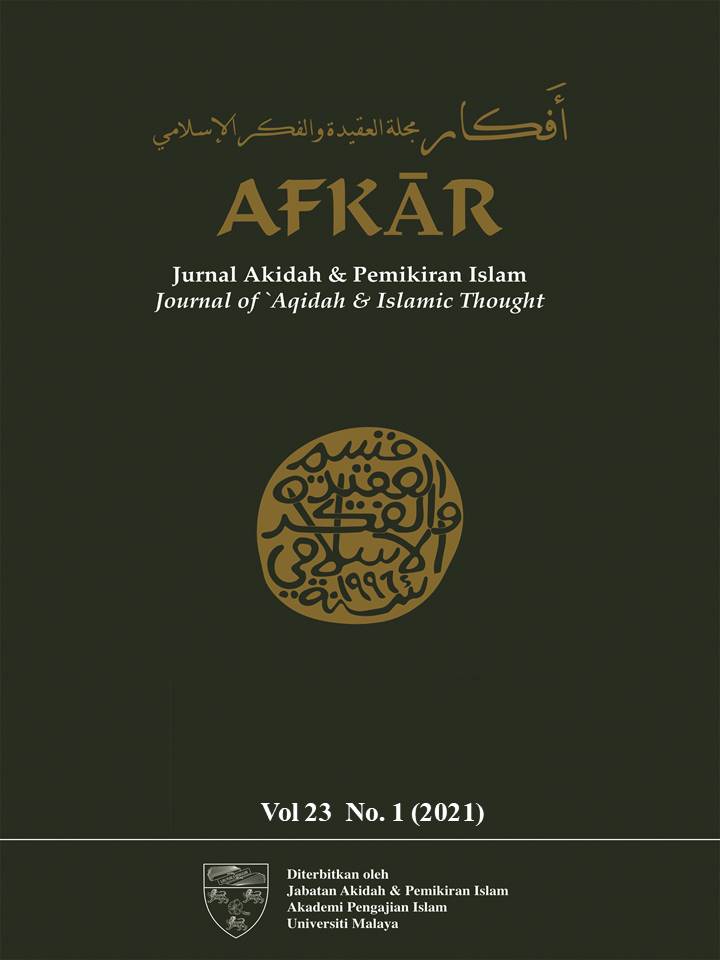Free Will versus Belief in Qadr? The Response of Sa‘id Nursi and its Modern Relevance
DOI:
https://doi.org/10.22452/afkar.vol23no1.4Keywords:
Free will; qadr; Sa‘id Nursi; good and evil; modern relevance.Abstract
The need of modern man requires more practical answer from religious perspective to support them in facing rapid changes and high demands of life. The issue of human will which is the most important and fundamental foundation to the concept of responsibility and morality is still open to discussion and debate. This paper aims at exploring the view of a reformer of Islam, Badiuzzaman Sa‘id Nursi in his 26th Word of his Risale-I Nur. Rather than having the discourse in a purely theological method, Nursi demonstrates it in a synthesis manner and suitable with modern man. The issue which is normally brought as juxtaposed with the concept of absolute will of God is dealt with in a harmonious way and suitable to all readers. Other than the phenomenological approach to the ontology of solving the relationship between God’s power and human will, Nursi also brought in very remarkable explanation about good and bad and how human should deal with them. Through-out his explanation, Nursi came with interesting illustrations and therefore successful in explaining the issue effectively. This suits his status as a reformer of Islam who came to shed lights on crucial issues with modern approach.
Downloads
References
Abrahamov, Binyamin. “A Re-Examination of al-Ash‘arī’s Theory of Kasb According to Kitab al-Luma‛”. Journal of the Royal Asiatic Society of Great Britain & Ireland (1989): 210–221.
Abu-Rabi’, Ibrahim M. Islam at the Crossroads: On the Life and Thought of Bediuzzaman Said Nursi. New York: State University of New York Press, 2003.
Campanini, Massimo. “The Mu‘tazila in Islamic History and Thought.” Religion Compass vol. 6 (2012): 41-50.
Dunn, Shannon. “Myth or Method: Religious Ethics, MacIntyre’s Modernity, and the Question of Power.” Soundings: An Interdisciplinary Journal (2015): 233-259.
Fazli, Abdul Hafeez. “Islamic View of Omniscience and Human Freedom.” al-Hikmat (2006): 11-47.
Horkuc, Hasan and Colin Turner. Said Nursi: Makers of Islamic Civilization. London: I. B. Tauris & Co. Ltd., 2009.
‘Irfan ‘Abd al-Hamid Fattah. Dirasat fi al-Firaq wa al-‘Aqa’id al-Islamiyyah. Amman: Dar al-Bashir, 1997.
Izutsu, Toshihiko. God and Man in the Quran. Selangor: Islamic Book Trust, 2002.
Kalin, Ibrahim. “Mulla Sadra on Theodicy and the Best of All Possible Worlds.” Journal of Islamic Studies (2007): 183-201.
Kallenberg, Brad. “The Master Argument of MacIntyre.” In Virtues and Practices in the Christian Tradition: Christian Ethics after Macintyre, eds. Nancey Murphy, Brad Kallenberg and Mark Thiessen. Notre Dame: University of Notre Dame Press, 1997: 21-50.
Mardin, Serif. Religion and Social Change in Modern Turkey: The Case of Bediuzzaman Said Nursi. Albany: State University of New York Press, 1989.
Mazheruddin, Siddiqi. “General Characteristics of Muslim Modernism.” Islamic Studies vol. 9(1) (March 1970): 33-68.
Mohamed, Yasien. “The Concept of Predestination And Free Will in Iqbal and Nursi.” Journal of ‘Aqidah & Islamic Thought (AFKAR) (2006): 93-120.
Nursi, Badiuzzaman Said. Al-Ṭalāsim. Istanbul: Dar al-Sanabil al-Dhahabiyyah, 2011.
Özcan, Hanifi. “Human Freedom: From the Point of View of Knowledge-Object Relationship.” Journal of Islamic Studies vol. 7 (1996): 1–15.
Pavlovitch, Pavel. “The Concept of Dahr and its Historical Perspective in the Ğāhiliyya and Early Islam.” The Arabist (2003): 51-59.
Pessagno, Meric. “Irāda, Ikhtiyār, Qudra, Kasb the View of Abū Manṣur al-Māturīdī.” Journal of the American Oriental Society vol. 104(1) (1984): 177-191.
Watt, William Montgomery. The Formative Period of Islamic Thought. London: Oneworld Publications, 1998.
Watt, William Montgomery. “Free Will and Predestination in Early Islam.” The Muslim World vol. 36 (1946): 124–152.









